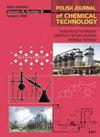瓜尔胶的磺化改性及其作为压裂液增稠剂的性能
IF 1
4区 工程技术
Q4 CHEMISTRY, APPLIED
引用次数: 0
摘要
为解决油田压裂液用改性瓜尔胶制备过程中降低水不溶物含量与保持高粘度之间的矛盾,本研究采用3-氯-2-羟丙基磺酸钠作为改性剂制备磺化瓜尔胶。通过正交实验和单因素外推实验探讨了反应条件的影响,确定最佳工艺如下:反应温度为 26 oC,反应时间为 2.0 h,氢氧化钠占瓜尔胶的质量分数为 1.0%,3-氯-2-羟丙基磺酸钠的用量占瓜尔胶的质量分数为 0.5%。此外,还研究了磺化产品的温度稳定性、过滤性能和对形成粘土的抑制作用。结果表明,0.6% 瓜尔豆胶溶液的表观粘度提高了 33%,水不溶物含量降低了 0.42%,温度稳定性、过滤性和粘土抑制性都得到了改善。尤其是交联磺化瓜尔胶的粘度比未改性瓜尔胶高 100%。通过红外光谱、DSC、热重和元素分析,对磺化瓜尔胶的结构进行了表征和确认。本文章由计算机程序翻译,如有差异,请以英文原文为准。
Sulfonation Modification of Guar Gum and Its Performance as a Fracturing Fluids Thickener
To solve the contradiction between reducing water-insoluble content and maintaining high viscosity in the preparation of modified guar gum for oilfield fracturing fluid, in this work, sodium 3-chloro-2-hydroxypropylsulfonate was used as a modifier to prepare sulfonated guar gum. Orthogonal and single-factor extrapolation experiments were conducted to explore the effects of reaction conditions and the optimal process was determined as follows: reaction temperature of 26 o C, reaction time of 2.0 h, sodium hydroxide as a mass fraction of guar gum of 1.0%, and sodium 3-chloro-2-hydroxypropyl sulfonate dosage as a mass fraction of guar gum of 0.5%. Furtherly, the temperature stability, filtration property, and inhibition of formation clay of the sulfonated products were investigated. The results showed that the apparent viscosity of 0.6% solution of guar gum was increased by 33%, the water-insoluble content was decreased by 0.42%, and the temperature stability, filtration resistance, and clay inhibition were all improved. Especially, the viscosity of cross-linked sulfonated guar gum is 100% higher than that of unmodified guar gum. The structure of sulfonated guar gum was characterized and confirmed by infrared spectrum, DSC, thermogravimetric, and elemental analysis.
求助全文
通过发布文献求助,成功后即可免费获取论文全文。
去求助
来源期刊

Polish Journal of Chemical Technology
CHEMISTRY, APPLIED-ENGINEERING, CHEMICAL
CiteScore
1.70
自引率
10.00%
发文量
22
审稿时长
4.5 months
期刊介绍:
Polish Journal of Chemical Technology is a peer-reviewed, international journal devoted to fundamental and applied chemistry, as well as chemical engineering and biotechnology research. It has a very broad scope but favors interdisciplinary research that bring chemical technology together with other disciplines. All authors receive very fast and comprehensive peer-review. Additionally, every published article is promoted to researchers working in the same field.
 求助内容:
求助内容: 应助结果提醒方式:
应助结果提醒方式:


